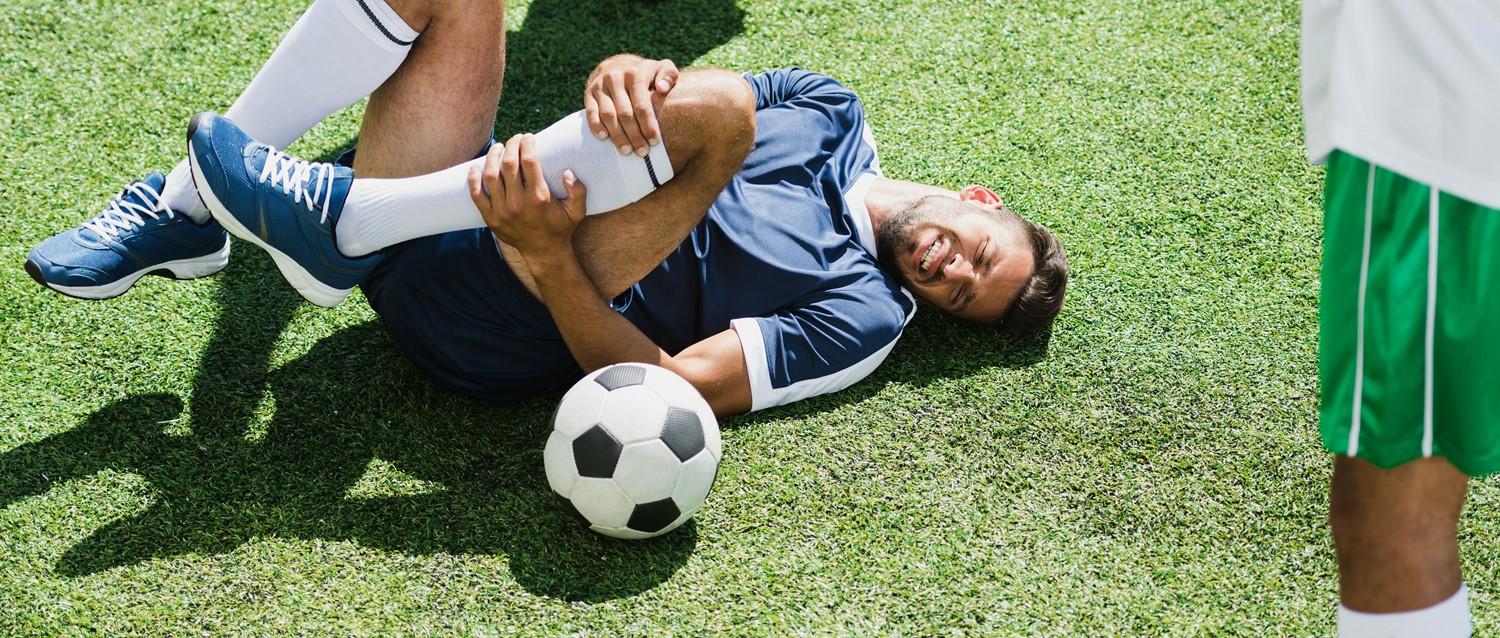
How a sports injury can affect your mental health
Peer reviewed by Dr Sarah Jarvis MBE, FRCGPLast updated by Lydia SmithLast updated 23 Sept 2019
Meets Patient’s editorial guidelines
- DownloadDownload
- Share
- Language
- Discussion
When it comes to sports injuries, we're most likely to focus on the pain and how it affects our physical health. But injuries can also have a profound impact on our emotional well-being.
In this article:
When I went for my first ever run in 2015, I never wanted to go again. I set off at full pelt, only to limp back home five minutes later, sweating, aching and out of breath.
The next day I forced myself to try again - and surprised myself by continuing to go each day until it got easier. Over time, I actually began to enjoy running. My mood felt lifted and my anxiety felt more manageable. I was fitter than ever before and I had more energy and confidence. I wanted to push myself, so I signed up to a half marathon the following year.
I trained hard, running longer distances each week and eating healthily. I also raised a large sum of money for charity. I felt prepared and ready. Then two weeks before the big day, I tripped over an uneven pavement on an early morning run and fell, hitting my kneecap on the concrete.
The pain was unbelievable. Over the course of the day, my knee ballooned out and turned a deep shade of purple. After a few days of ice packs and knee supports, I visited my doctor to see if I had done any permanent damage. I hadn't, thankfully - but I wouldn't be able to run for the foreseeable future.
People experience far worse injuries and accidents, of course, but I still felt devastated. All the time and effort I had spent preparing for the half marathon felt wasted and I felt anxious about not being able to run each day. Running was a lifeline for my mental health and suddenly, for the first time in a long time, I no longer felt in control.
Continue reading below
Why can a physical injury affect your mental health?
When we experience an injury during exercise, we tend to forget about the impact on our mental well-being. But the two can be closely linked.
"During exercise increased heart rate means more oxygen is pumped to the brain and other organs too. The brain thinks that we are going to fight an enemy or run away from it and it secretes endorphins which give us a feelgood factor," says Gary Bloom, a clinical psychotherapist and spokesperson for the UK Council for Psychotherapy.
"Research has also shown that regular aerobic exercise develops an area of the brain called the hippocampus which aids memory and learning," he adds. "In short, it's a powerful natural antidepressant. When you are injured all the above comes to a grinding halt and many amateur and professional sportspeople find the lack of endorphins quite a serious issue to deal with."
The frustration and sense of helplessness that can come with an exercise injury can also impact mental health too. If you find you can no longer - even temporarily - do something you previously enjoyed, like running, football or a gym class, it can be demoralising. Many of us use exercise as a form of stress relief or relaxation, so it can be psychologically challenging when you suddenly can't do it.
"Exercise is such a wonderful way to improve our mental health, as we get fitter, stronger and more flexible, we feel more empowered and embodied," says Eve Menezes Cunningham, a member of the British Association for Counselling and Psychotherapy, a therapist and self-care coach at Selfcarecoaching.net.
"When unable to work out, it can feel incredibly frustrating. We might worry about losing all the gains we've made and we also miss out on the stress and anxiety-busting benefits of movement."
If you are struggling with an exercise injury, however, there are steps you can take to improve and protect your mental health.
Try to relax
Back to contentsIt can be easier said than done, but it's important to find a new way to switch off and relax - whether it's taking up a new hobby or seeing friends more often. "There are lots of ways of relaxing when you are injured and unable to train aerobically," Bloom says.
"The most obvious example of this is meditation and many psychotherapists are trained in these techniques. Gentle stretching exercises or yoga may be possible but please seek medical advice before trying any of these."
Meditation or mindfulness apps can be a great way to feel calmer. Try the Headspace app, which offers a number of different guided meditation sessions.
Continue reading below
Aim for a target
Back to contentsBeing wary not to put too much pressure on yourself, it can help to aim towards a realistic recovery date. Your GP or health specialist will be able to advise you.
"It's also important to remember that most injuries are temporary and it's helpful to concentrate on a comeback date which might be circled in your diary," Bloom explains. "This gives you a target to aim for - but once again seek clear medical advice before picking up training after a long break."
Get professional help
Back to contentsIf you are struggling with your mental health, it's important to seek professional help. Book an appointment with your doctor, who can advise on the best course of action for you. Alternatively, if you live in England, you can refer yourself to counselling on the NHS by signing up for an account at Patient Access and using their NHS self-referral services link.
"I find that in professional athletes mental health issues often accompany long injury layoffs and it's important to have regular therapy sessions, especially in the early days when mobility could well be an issue," Bloom says.
"I often work with offsetting the effects of 'tyranny of success'. This is where many athletes are told by key support staff that they will definitely get better and regain full fitness and yet in truth nobody can be certain about this.
"This is why therapy is important to add a degree of realism about slowly regaining fitness with the possibility of lasting damage after a serious injury."
Continue reading below
Go easy on yourself
Back to contentsIt's tempting to beat yourself up if you can't do things you used to straightaway like running long distances, but it's crucial to be kind to yourself. Pushing yourself too hard may also lead to further injury.
"Be as gentle with yourself as possible," says Menezes Cunningham. "Instead of comparing your range or capacity for movement and pain threshold with pre-injury, you get to know your body as it is now.
"It's possible to come back stronger, faster and fitter but rushing things will make it worse."
Patient picks for Sports injuries

Bones, joints and muscles
When is it safe to return to sport after an injury?
If you’ve been injured playing football – or through any other sport – you’re probably impatient for the injury to heal so you can get back to normal. While the situation is most acute for professional sportspeople, who may miss important matches or even whole seasons, it can still be tough for ordinary people who have made sport a big part of their life.
by Abi Millar

Bones, joints and muscles
Why head injuries in sport need to be taken more seriously
Head injuries are common across the sporting world. Often they can be very mild and symptoms can disappear in a matter of hours or days. However, sometimes a knock to the head, especially if there are multiple knocks in a short space of time, can lead to serious brain damage or even death.
by Milly Evans
Continue reading below
Article history
The information on this page is peer reviewed by qualified clinicians.
23 Sept 2019 | Latest version

Ask, share, connect.
Browse discussions, ask questions, and share experiences across hundreds of health topics.

Feeling unwell?
Assess your symptoms online for free
Sign up to the Patient newsletter
Your weekly dose of clear, trustworthy health advice - written to help you feel informed, confident and in control.
By subscribing you accept our Privacy Policy. You can unsubscribe at any time. We never sell your data.